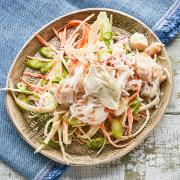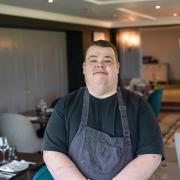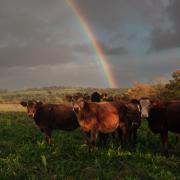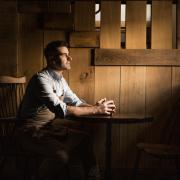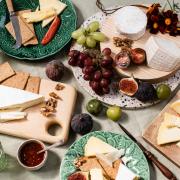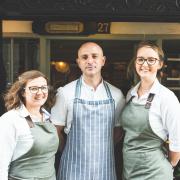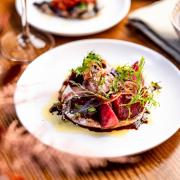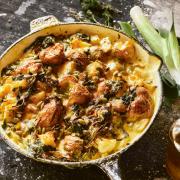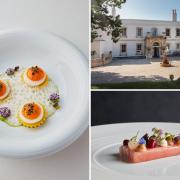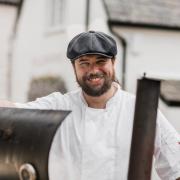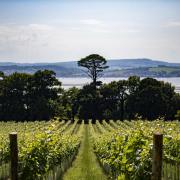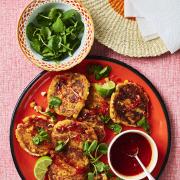Barbecuing expert, author and food influencer Marcus Bawdon talks about the dos and don’ts of barbecuing.
As it turns out, most of us have spent years grilling and not barbecuing. Luckily, (for those of us whose barbecuing skills need fine tuning before the summer), help is at hand. Marcus Bawdon is a Devon-based barbecuing expert and he runs one of the few barbecuing schools in the UK.
The UK BBQ School was set up last summer, in a purpose-built wooden building, in the countryside just outside Cullompton. Marcus, who has worked as a geologist in the gas and oil industry for 25 years, founded the school when his job was affected by the pandemic.

He started barbecuing about 12 years ago and soon had friends lining up for advice. Marcus recalls: “I would get a few friends together and we would have a little class.” The dad of three started running courses for members of the public six years ago. Fast forward to 2021 and demand for Marcus’ barbecuing courses has rocketed.
Last year, he ran his courses for nine months of the year, finishing before Christmas and starting up again in February this year. People want to learn from their mistakes. “The main errors people make in barbecuing are; they hurry, they don’t use a thermometer, they don’t use a lid, they try to over-complicate it, they don’t get the heat right for the food they are cooking and they use too much charcoal,” Marcus explains.
Whilst we talk, Marcus fires up a small kettle barbecue – he’s cooking me lunch – under the storm damaged roof of the barbecue school. There are about a dozen barbecues of all shapes and sizes around the table – ceramic eggs, an Argentinian grill-style barbecue and a range of Weber barbecues – some worth a few thousand pounds.
It’s taken hours of practice for Marcus to hone his skills and he admits he wasn’t always a successful barbecue cook. “I was always the one cooking and barbecuing, feeling really stressed and burning food. At one event we had, everyone was having fun and I was thinking, there’s got to be a better way of feeding a crowd and enjoying it more,” he says.
Thankfully, there is a better way. “It’s about cooking bigger chunks of meat for a longer amount of time,” Marcus explains. A barbecue is essentially an outdoor oven, so, the temperature has to be controlled by cooking food slowly, over medium-hot charcoals in a barbecue with a lid. It’s roasting, but with an additional smoky flavour.
Marcus continues: “Americans have barbecuing in their food culture and we don’t have that. We were famous for cooking large chunks of meat, but we lost it in the convenience era of the ’70s and ’80s.”

There’s nothing convenient about barbecuing; it takes technique and patience. A sometimes fish eater and never meat eater, Marcus has cooked me salmon (on a piece of silver birch) with a raft of baby leaks, topped with grated cheddar cheese and an Argentinian-style salsa. It’s very tasty.
Rather surprisingly, Marcus was a vegetarian for 14 years before he got into barbecuing. He recalls: “My dad believed in organic, local, good quality, meat. I went off to university and I couldn’t afford good quality meat, so I just carried on being a vegetarian.”
Having trained as a geologist, Marcus began working for an oil company. His work took him to Scandinavia, Denmark, West Africa and Aberdeen. He says: “I was away for about six months of the year. I was building up my barbecue business in my down time.”
One thing’s for sure, Marcus achieved a lot in his down time. His first cookery book, Food and Fire, was published in 2019. His second book, Skewered, is inspired by food from around the world and it was published in 2021.
Marcus also started a digital and print magazine in 2020, called BBQ, managing to feature an interview with celebrity chef Tom Kerridge in the first issue. He recalls: “I was sat in an oil rig in the North Sea in a storm. I had no drilling work for a couple weeks and so I googled how to start a digital magazine. I sat there for two weeks, working on the magazine in my quiet time.”
With a third cookery book in the making and barbecue courses booking up quickly, it’s clear Marcus’ skill set and love of outdoor cooking is helping to change the way we barbecue.

Try this barbecue recipe for charred leek rafts
(Serves 2)
Ingredients
6 medium-sized leeks
Handful of grated mature cheddar cheese
Coarse sea salt and coarse black pepper
2 cloves of garlic
Handful of fresh flat leaf parsley and oregano
1 tbsp dry oregano
60ml extra virgin olive oil
Pinch smoked paprika
2tbsp red wine vinegar
1 tbsp Aleppo chilli flakes
Method
Set up your grill for moderate heat direct cooking with the lid on. Trim your leeks and place them next to each other. Use two soaked wooden skewers to make a raft from the leeks, skewering through the middle of the leeks at either side of the raft.
Rub a tsp of olive oil over the leeks, lightly season with a pinch of sea salt and pepper, and place on the grill for about eight minutes until the outside of the leeks is slightly charred.
While the leeks are cooking make up the chimichurri by blitzing up a couple of good pinches of coarse sea salt, garlic, all the herbs, olive oil, red wine vinegar and chilli flakes.
Place the cheese on top of the leeks and the lid of the grill back on and melt the cheese for a few minutes, drizzle over the melted cheesy leeks a couple of teaspoons of the chimichurri and serve.
Marcus’ top ten barbecue tips
1. Use high quality charcoal – think of it as an ingredient in itself.
2. If you cook with gas, pop a chunk of smoking wood near the gas burners to add a smoky flavour.
3. Use the best quality meat you can afford.
4. Don’t use too much charcoal. A small handful or two of good quality charcoal can go a long way.
5. Set up the grill for two-zone cooking, with charcoal only taking up a third of the grill area.
6. Use a lid. The lid will turn your barbecue into a smoky oven and you can cook large bits of meat slowly without burning the food.
7. Use a digital probe thermometer for accuracy and confidence in your cooking, such as a Thermapen or Meater.
8. Remember the carryover. Most meat carries on cooking and going up a few degrees when you take it off the barbecue. Allow for this by taking meat off a few degrees before your target temperature.
9. Have fun. Barbecuing is about trying new recipes, ingredients and techniques – enjoy it!
10. Always have a cold drink to hand – barbecuing is hot work!




